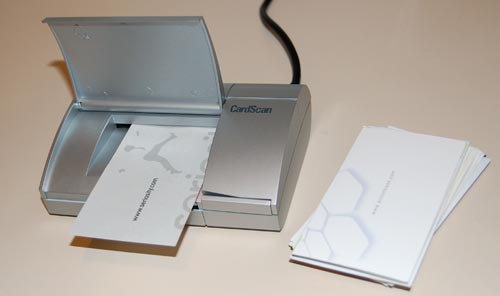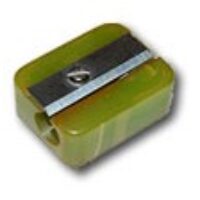The day I left New York to fly back to Israel I bought, on an impulse, a CardScan business card scanner at Best Buy. I’d received all these cards from colleagues at the IORG conference, and the thought of typing all the details into my computer was depressing…
Anyway, I got home, installed the software, and the scanner wouldn’t work right. Yikes! I mean, I build electronic gear, so I know this can happen… but I was thousands of miles from the nearest Best Buy. I’d just transported a paperweight halfway across the planet!
So I called CardScan’s tech support number, and a nice gentleman there took me patiently through some troubleshooting and concluded that the hardware was at fault. The guy told me he’d get someone in touch about a replacement and I went to sleep. Next day I get an email from a Mr. John Phillips in Canada, who is with OptiProc, a CardScan reseller. He told me to send him a scan of my receipt, my address, a description of the fault, and so on; and he’ll ship me a replacement as soon as I did. Not after considering my reply, mind you; nor after I send back the unit. Immediately when he gets my address. And he did; in fact he FedEx’d the new unit, for added speed. Only when this tested OK – which it did – was I to post the old unit back to Canada.
Good customer support is a key part of the user experience, and this is as good as it gets – so, kudos to CardScan, to OptiProc, and to John!

The scanner, by the way, turned out to be a cute little gadget – you place a card in its input end and seconds later it’s scanned, OCR’d and parsed into your contacts database. A truly useful device if you venture often outside your cubicle and actually meet other people!

August 1, 2008 — 4:56 pm
Ten years ago I initiate and implement the 1st Knowledge management system at the Engineering & Planning division of Bezeq: It was a network of 15 Cardscan units, installed at the offices of the executive team of the division.
I became aware to the phenomenon that these executives get thousands of business cards during meeting, conferences etc, and – thet wrote someimportant notes on the back of the cards. I did that too, and suffer from the need to look for a specific card when needed, and/or the need to copy the detaiks manually to my Outlooc Address book.
A frined of mine told me about Cardscan, I order on unit as a demo, and when looking at it, I realise a magic button on the Cardscan software dialog box: it said – “press for synchronise with Microsoft Outlook!”.
I realise that tis can be changed not to a personal folder at my outllok, but to a public one.
So, I set a public folder on the Exchange server, bought another fourteen units, istalled them to the secretaries PCs and taught them to scan the bunch of cards, and another important thing – to include the hand-written notes in each record – and – to press the synchronisation button.
The effect was astonishing: It is not only that I solved a very nudging and troubeling need for them, I also created a unique and precious database of all the people that met with Bezeq people, and – what was written on each one of them duting those meeting – precious knowledge per ce!
it was really great.
Shabbath Shalom
Yigal
August 1, 2008 — 6:13 pm
Well done, Yigal! And a cool story (of course!)
Come to think of it, ten years ago I bought a CardScan too, but this was before USB, Plug and Play, and so forth… it gave me a hard time and I gave up on it eventually. The current model is smaller, needs no power supply, has more powerful software and will certainly fare better with me!